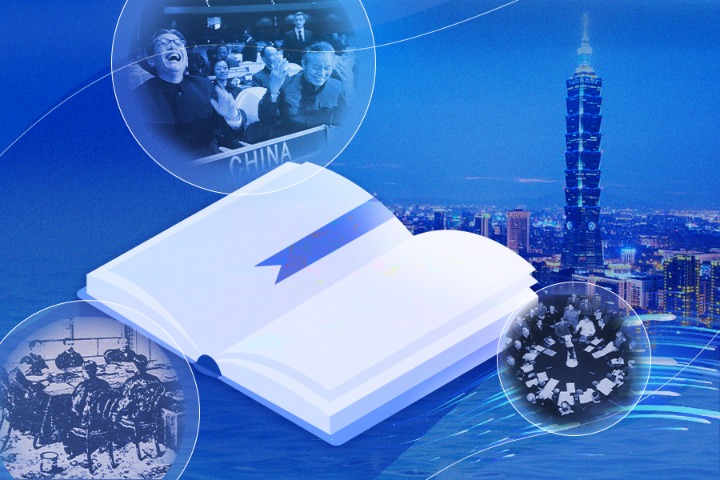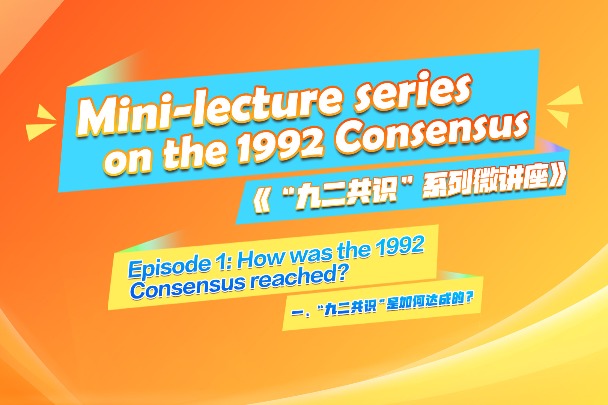Two cities strive to strengthen cross-Straits exchanges

While the United States ratchets up its anti-China rhetoric by provoking tension across the Taiwan Straits, Beijing has been continuing to promote the consolidation of exchanges with the island. This process goes on despite US attempts to step in and upset the applecart.
Ever since 2010, the mayors of Shanghai and Taipei have had annual meetings to discuss bilateral cooperation. Trade flourished and was valued at more than $312 billion in 2021 at a growth rate of 30 percent.
Integrated circuits are Taiwan's main items sold to the Chinese mainland to fill the shortfall of chips amid the US ban on exporting them to China. And before the COVID-19 outbreak, some 3 million tourists from the mainland visited the island each year.
The central authorities in Beijing are planning a high-speed, cross-Straits rail link. The tunnel under the Taiwan Straits for the rail service was announced in 2016 and slated for completion in 2035.Meanwhile, the link between Beijing and the coastal island of Pingtan (off Xiamen) has been completed.
Taiwan leader Tsai Ing-wen, who is strongly influenced by Washington, is not in favor of the proposed link, which would bring great economic benefits to both sides. That is likely to last some time, as her Democratic Progressive Party is expected to retain power to at least the next leadership election in early 2024.
Last year, the Shanghai-Taipei City Forum was held virtually due to COVID restrictions. But that didn't stop it from being seen in a positive light.
"The two sides of the Taiwan Straits belong to one family. Shanghai will, as always, care for and support the development of Taiwan compatriots and Taiwan enterprises in Shanghai," said Shanghai Mayor Gong Zheng.
Taipei Mayor Ko Wen-je responded: "The experience of the forum showed the right way to go: Communication is better than disconnection, and friendliness is better than hatred."
However, that was last year.
This year, there was a different, much cooler atmosphere, due to US intervention. A visit to Taiwan by President Joe Biden would be in conflict with the US' adoption of the one-China policy, but that policy was twisted by the visit by at least one politician, US House Speaker Nancy Pelosi, who did the dirty work for the US administration.
As the forum opened on July 19, the US was testing the waters of a visit to Taiwan by Pelosi, and it drew the reaction the US expected. China was against it and warned of severe consequences if the visit took place. This shook the populace of Taiwan, and the forum was cut back to a half-day session.
However, this did not stop the mayors of Shanghai and Taipei from repeating their previous commitments. Mayor Ko, in a pre-recorded speech, stressed the need for mutual respect and cooperation. Dialogue was better than confrontation, and avoiding conflict was the hope of people on both sides of the Taiwan Straits, he said.
The Democratic Progressive Party is pursuing "independence "with the unofficial backing of the US. But local support is far from unanimous.
Since the Pelosi visit to Taiwan in August, there has been a steady stream of US politicians visiting the island to lend their support to its "independence "and boost the ego of Tsai. History has shown that, in its quest to maintain global dominance, the US cares naught for the collateral damage that might result from its actions.
While the US believes that US-style democracy is the only democratic system worthy of supporting and promoting, it fails to understand that what works for one country may not be suitable for another, due to the distinctive historical and cultural differences of different countries.
What is good for the goose may not be good for the gander.
The author is a former chief information officer of the Hong Kong Special Administrative Region's government and a media consultant.




